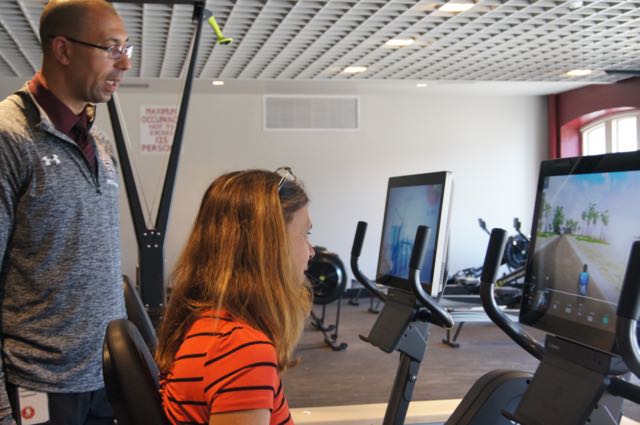Vital Aging Fair Draws a Crowd to Scarsdale Library
- Details
- Written by: Joanne Wallenstein
- Hits: 4337
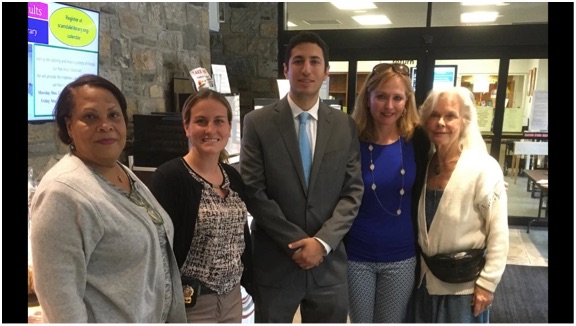 A steady stream of locals attended the Second Annual Vital Aging Fair at the Scarsdale Library on Monday. About 30 vendors were on hand to discuss a wide range of topics, from fitness and nutrition to legal and financial assistance. Local dignitaries Mayor Dan Hochvert, Trustees Callaghan and Pekarek, and County Legislator David Tubiolo were also on hand to show their support.
A steady stream of locals attended the Second Annual Vital Aging Fair at the Scarsdale Library on Monday. About 30 vendors were on hand to discuss a wide range of topics, from fitness and nutrition to legal and financial assistance. Local dignitaries Mayor Dan Hochvert, Trustees Callaghan and Pekarek, and County Legislator David Tubiolo were also on hand to show their support.
The free annual event is a joint effort of Scarsdale Edgemont Family Counseling Service, Scarsdale Recreation, and The Scarsdale Library. Vendors who presented this year included: My Second Home, The Kensington, Home Instead, Charles Schwaab, The Osborne, Eldercare, Medicaid Solutions, Silver Bills LLC, WestFair Rides, Ikor, Five Star Premier Residences, Right at Home, Alliance, SMHAL, Alliance HomeCare, Atria Woodlands, A Dignified Life, DOROT, WJCS, WEDC, JCC, Aging Smart, Loving Meditations, Mission to Wellness, REYNA, Fitness Link, Restore the Core, The UpperClass, and Scarsdale Police Detective Patricia Arcesi.
SFCS wishes to offer a special thanks to sponsors Massage Envy and Atria.
Article by Maryellen Saenger, Coordinator Aging in Place at SFCS
Firefighters Demonstrate What to Do and What Not to Do in Case of Fire
- Details
- Written by: Joanne Wallenstein
- Hits: 4653
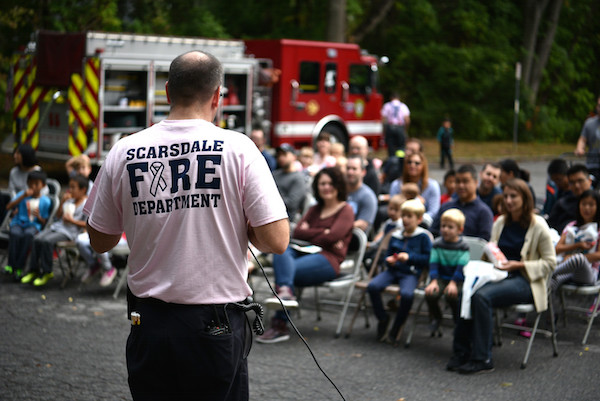 More than 300 people attend the Scarsdale Fire Department's Fire Fair on Saturday October 14. The fair demonstrated how to prevent fires and what to do in the case that one breaks out.
More than 300 people attend the Scarsdale Fire Department's Fire Fair on Saturday October 14. The fair demonstrated how to prevent fires and what to do in the case that one breaks out.
There was a stove fire/ grease fire demonstration, where people learned the proper way to use a fire extinguisher. A demonstration on the proper fire extinguisher to pick for certain types of fire was given by Steve Rossi of AAA Emergency. There was a bouncy house on hand from the children and plenty of popcorn, cotton candy and hotdogs to eat.
Career firefighters wore pink tee shirts for the month of October in support of Breast Cancer Awareness.
Photos by Jon Thaler: See more here:
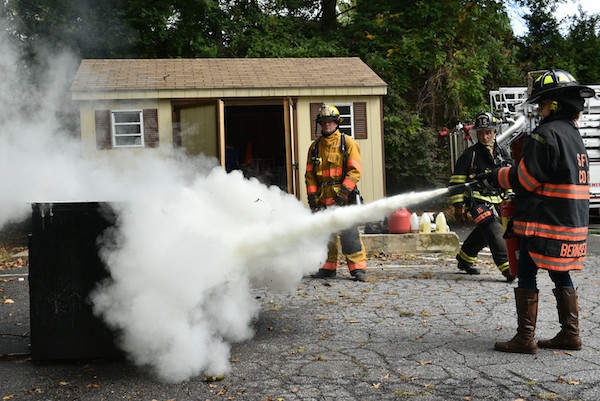
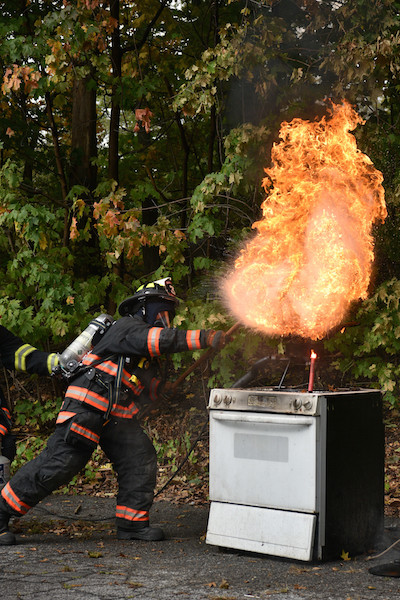
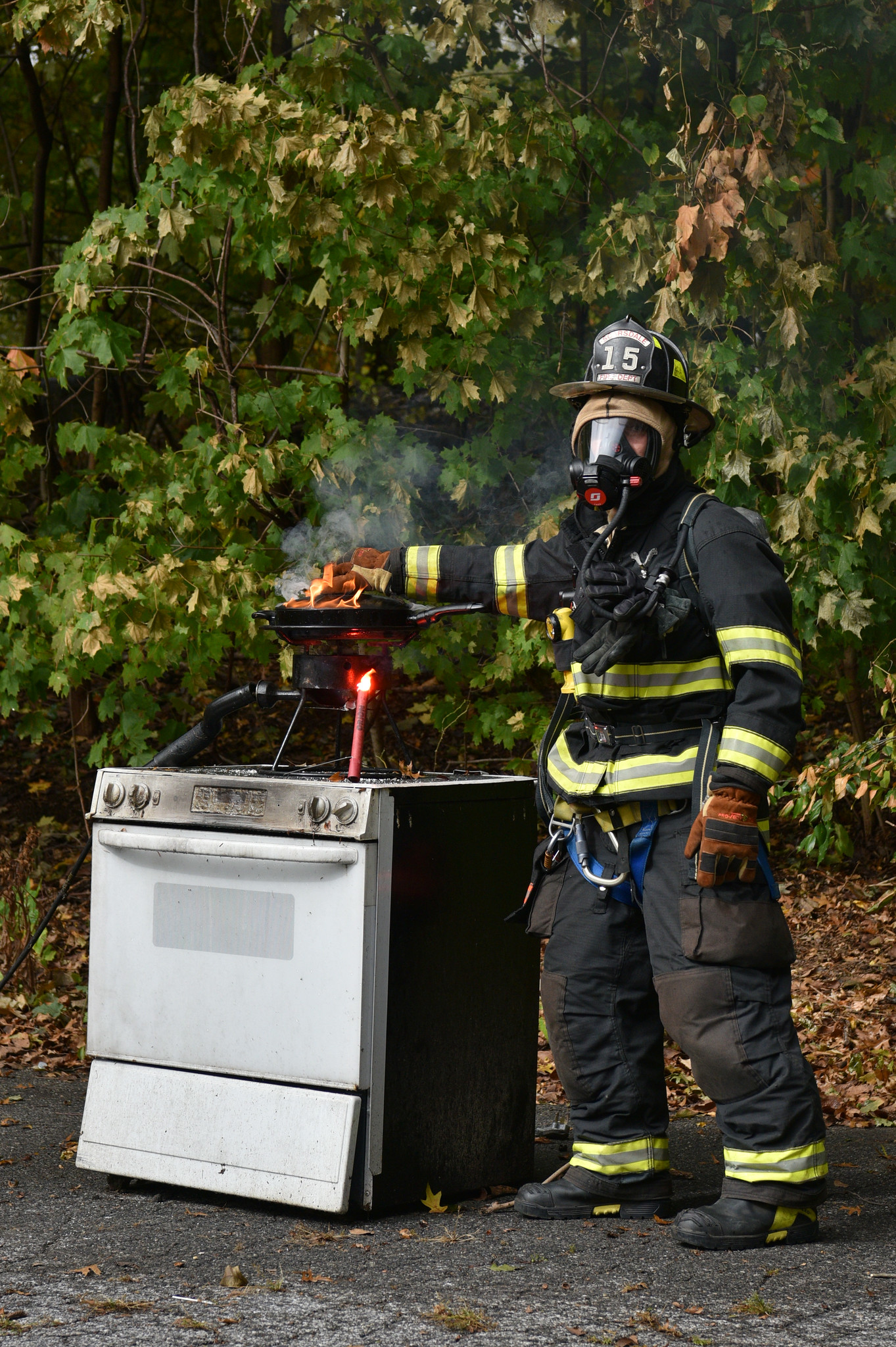
New Fitness Center at SHS Rivals Facilities at D1 Universities
- Details
- Written by: Joanne Wallenstein
- Hits: 9075
 Wow! I toured the new fitness center at Scarsdale High School and I was impressed. This facility was so nice it could convert the most stubborn couch potatoes into fitness freaks.
Wow! I toured the new fitness center at Scarsdale High School and I was impressed. This facility was so nice it could convert the most stubborn couch potatoes into fitness freaks.
After much discussion about the challenges of converting the basement of the high school – below the new gym – into a state of the art fitness facility, it's clear that this evolved into a successful project and a real asset for Scarsdale High School.
First of all the space is big – 6,000 square feet. And despite its location in the basement, it is above grade and a wall of south facing windows brings in plenty of natural light. In several areas of the room, the ceiling grid has been eliminated to accommodate the height of the machines. In addition to all the exercise equipment there is also a roomy floor area with special rubber flooring to facilitate yoga, pilates and stretching exercises.
SHS Athletic Director Ray Pappalardi explained that the vast facility and impressive training equipment can accommodate three classes of students at a time. Though it just opened at the beginning of school it is already being well used by everyone from sports teams and physical education classes to those with mobility challenges who find that the machinery can be accommodated for many purposes.
Pappalardi demonstrated use of the equipment starting with the Tire Lift for weight training saying that it teaches students to "lift the tire in a functionally appropriate way." The room is filled with all sorts of innovative equipment that Pappalardi says would rival the facilities at a Division 1 university.
We learned about the glut-ham machine and saw four racks of strength training equipment, each with three stations. There are rowing machines, treadmills that incline and decline, three types of elliptical trainers, octane climbing steps, cybex functional trainers and rows of stationary bicycles with video screens, similar to Pelotons.
We also saw "The Tank" which looks like a heavy cart on wheels that is pushed and pulled for strength training.
The facility is fully wired and has large video screens that can be used for instruction. Students will soon be able to use their personal devices to monitor their exercise and performance. Pappalardi noted that this feature allows students to measure themselves and work out to achieve their own personal best rather than gage themselves against group performance.
Pappalardi thanked the Scarsdale Foundation and Maroon and White for their contributions and the Madoff family for their generous donation that was used to purchase the exercise equipment.
It's an outstanding facility. If you get the chance, take a tour.
"Groundbreaking" of Supply Field Interim Library Marks a Major Step in Renovation of Scarsdale Library
- Details
- Written by: Joanne Wallenstein
- Hits: 6118
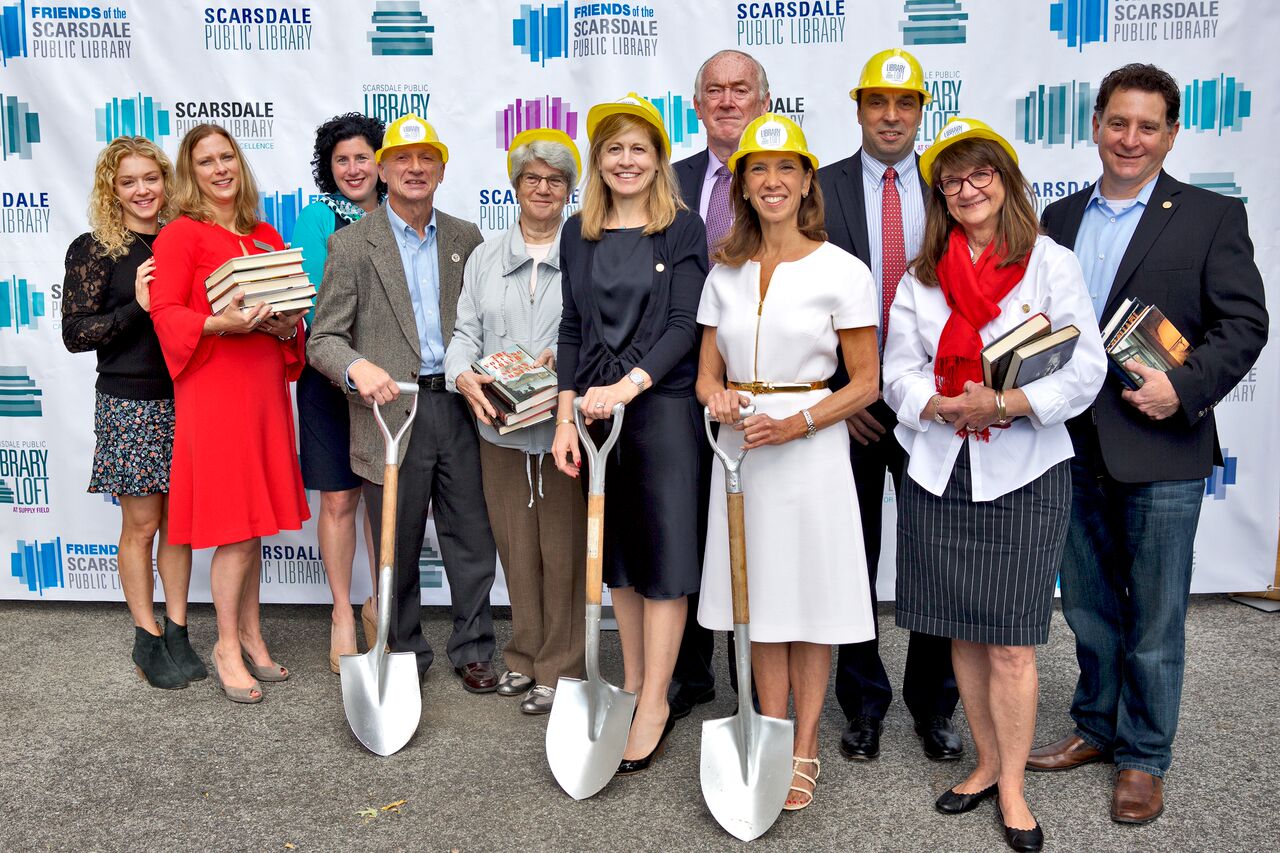 After seven years of studies, architectural drawings, discussion, village board approval, and a "quiet" phase of the fundraising campaign, the Scarsdale Public Libray took a major step toward its renovation and upgrading with the "groundbreaking" on Tuesday morning at the Supply Field building that will serve as a temporary library during construction.
After seven years of studies, architectural drawings, discussion, village board approval, and a "quiet" phase of the fundraising campaign, the Scarsdale Public Libray took a major step toward its renovation and upgrading with the "groundbreaking" on Tuesday morning at the Supply Field building that will serve as a temporary library during construction.
Speakers at the celebratory gathering that included village trustees and officials, current and former library board trustees and supporters, praised the co-operative efforts of the Library Board Trustees, Friends of the Library and the village and its staff for making a transformed library a reality.
Special praise was given to Scarsdale Assemblywoman Amy Paulin why secured $500,000 in state funding for work to prepare the Supply Field building for use as the interim facility.
"I know I share with all of you a goal to leave Scarsdale better than we found it, and Supply Field is a concrete step that makes lasting improvements possible for the library and Scarsdale Village," said Diane Greenwald, Library Board President.
Calling Scarsdale "special," Paulin thanked those involved "for taking on the initiative." She recalled the day seven years ago when a group came to her office to discuss the project. "I was uncertain it would happen," she said, "but you continued, and this is where we are today."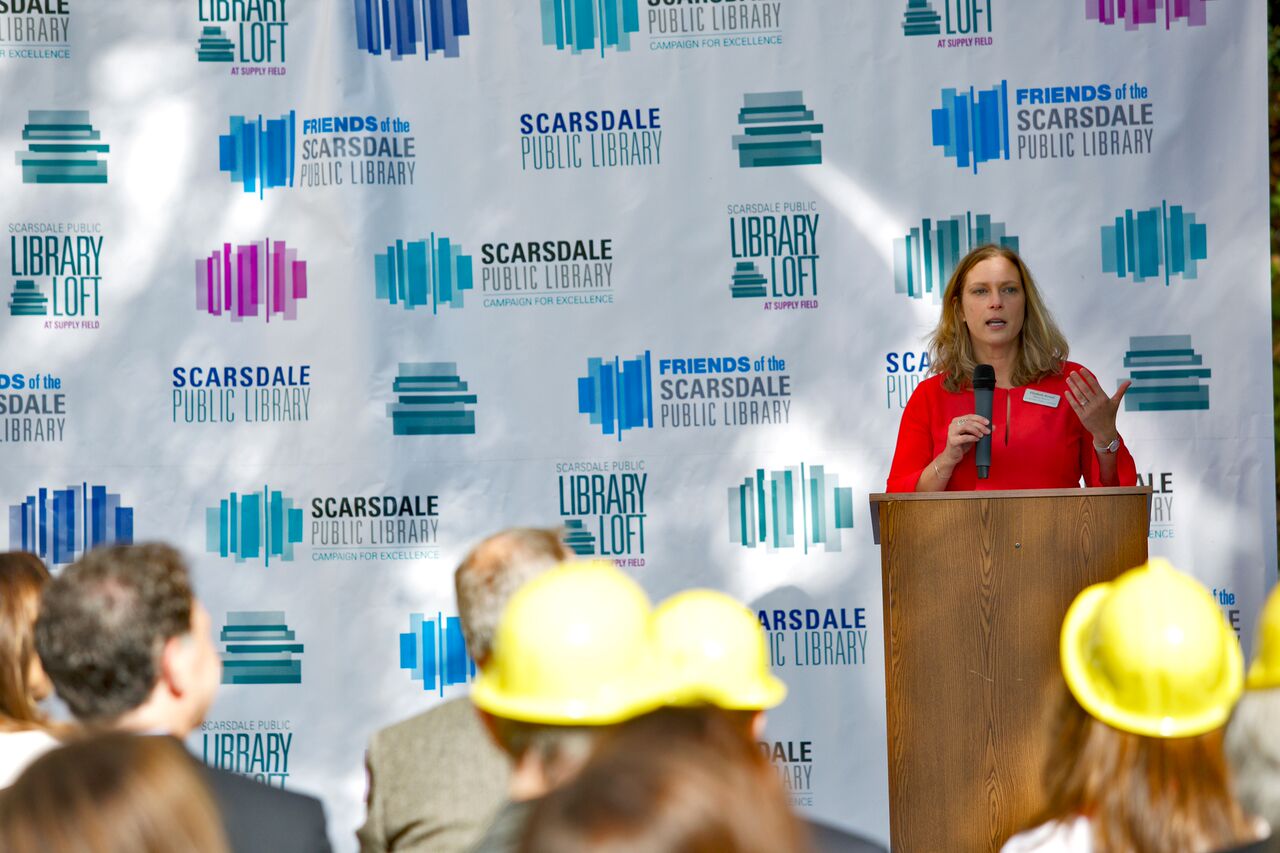
Dara Gruenberg, President of the Friends of the Library and co-chair of the Campaign for Excellence, noted that to date the campaign has raised $5.7 million toward its goal of $7.5 million which would initiate the village bonding the rest of the cost. She said the event kicked-off the public phase of the Campaign for Excellence fund-raising.
"I'm honored to live in a community that comes together and invests in such a critical resource that will benefit so many, not only right now, but for generations to come," Gruenberg said.
An emotional Elizabeth Bermel, Library Director, who noted that this week marks her eighth anniversary in Scarsdale, thanked the library staff and all those who "have been on this journey with me." She said Library Loft, the name for the interim facility, is scheduled for completion in early spring and the move from Olmstead Road library would take place when ground is broken at that facility.
At Supply Field "we will offer new and popular materials for all ages, wi-fi access, circulation services, and the same great personal service and more." Plans include increasing the library's online presence and providing programs offsite for children, teens and adults. "Stay turned to learn more as our plans solidify," she said.
Scarsdale Mayor Dan Hochvert recalled his introduction to a library in the 1940s by his older sister in their hometown of Buffalo. There were books and silence, no meeting spaces, cellphones or internet, he recalled. "The world has changed, but people need to have space to work together." He thanked the village staff and library groups and said of Paulin, "we have a state representative in Scarsdale who knows when we need help and gets it for us."
Link here for information about the Library Transformation Campaign for Excellence.
Parking Meter Pilot Program in Progress in Scarsdale
- Details
- Written by: Joanne Wallenstein
- Hits: 6994
 New smart parking meters are being installed in Scarsdale's Village Center as part of a Pilot Program. Residents and visitors can test four different meters as part of the Village's effort to examine user preferences and meter equipment performance prior to replacing exisitng equipment. The information garnered during the pilot period will aid the Village in selecting the parking meter that best meets the needs of residents and visitors frequenting the Village Center.
New smart parking meters are being installed in Scarsdale's Village Center as part of a Pilot Program. Residents and visitors can test four different meters as part of the Village's effort to examine user preferences and meter equipment performance prior to replacing exisitng equipment. The information garnered during the pilot period will aid the Village in selecting the parking meter that best meets the needs of residents and visitors frequenting the Village Center.
The pilot program is designed to give the consumer an opportunity to use multi space and smart single space meters, both of which provide various parking payment options. The Village has selected the POM smart single space meter, IPS smart single space meter, the T2 Systems Luke II multi space pay station and the MacKay Tango multi space meter, as the parking meter equipment to be tested in the pilot program.
The new meters will accept quarters as well as credit cards. They can also communicate seamlessly with smartphone parking payment apps, although the use of phone apps will not be part of the meter test period as we want parkers to experience using meters during the test period. In addition to providing consumers with more convenient ways to pay, new parking meter technology will allow the Village to examine detailed parking data to better manage available resources.
Additionally, online and phone surveys will enable consumers to share their views on ease of use, aesthetic preference, and other variables. Each test meter style will have a color-coded marker. The consumer will be able to go online or call the toll free number posted on the meter where they will be prompted to answer a few short questions. Survey answers are anonymous, but if a survey taker provides a single phone number at the end of the survey and they rate each of the four meter types, they are eligible to receive a free gift.
Youll find the new meters in the Village Center bordered on Popham Road, Chase Road, Spencer Place and East Parkway. Equipment is scheduled to be installed by the end of September and the meter test of the equipment will continue thru December 2017.













